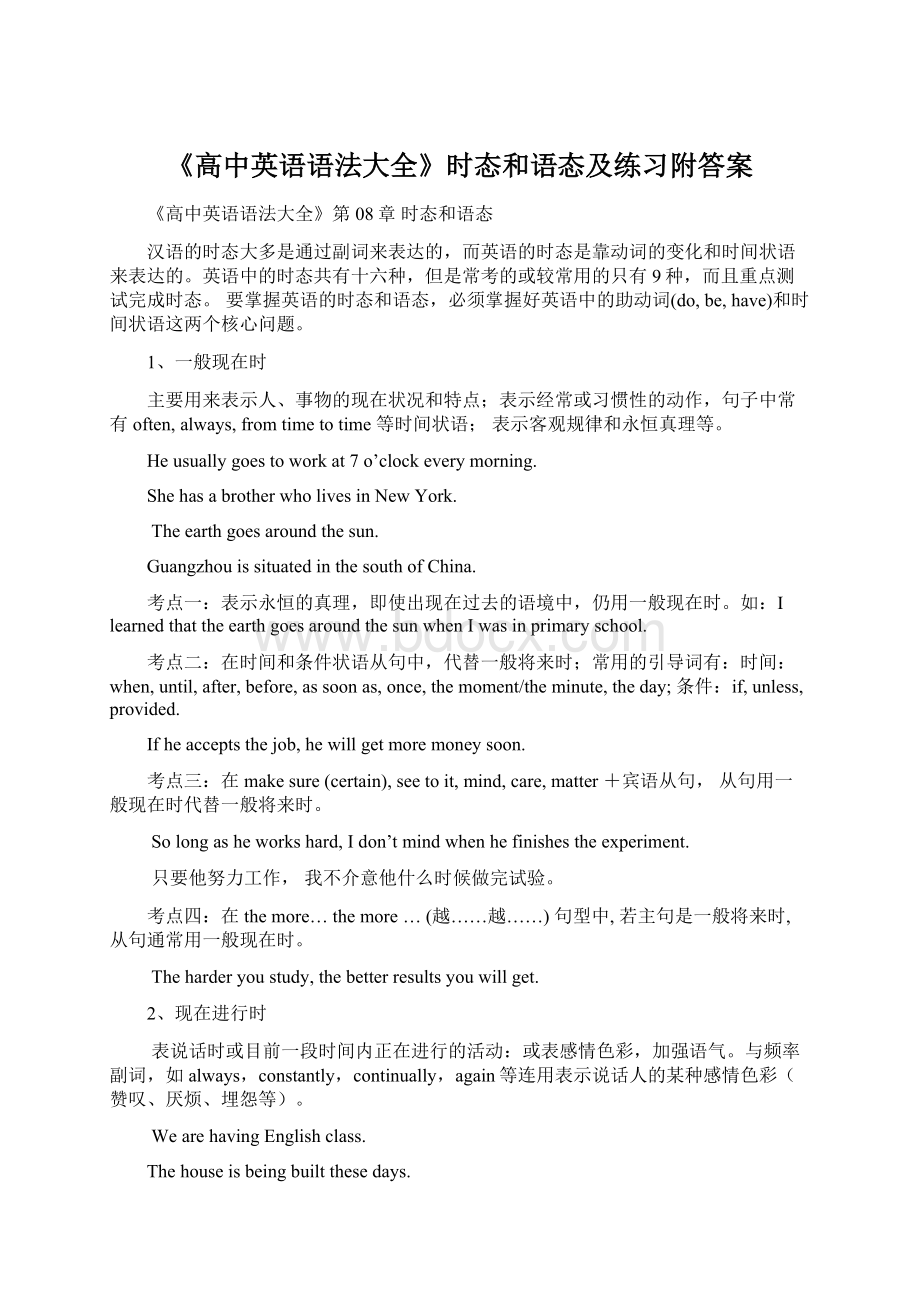《高中英语语法大全》时态和语态及练习附答案Word文档下载推荐.docx
《《高中英语语法大全》时态和语态及练习附答案Word文档下载推荐.docx》由会员分享,可在线阅读,更多相关《《高中英语语法大全》时态和语态及练习附答案Word文档下载推荐.docx(12页珍藏版)》请在冰豆网上搜索。

只要他努力工作,
我不介意他什么时候做完试验。
考点四:
在themore…themore…(越……越……)
句型中,
若主句是一般将来时,
从句通常用一般现在时。
Theharderyoustudy,thebetterresultsyouwillget.
2、现在进行时
表说话时或目前一段时间内正在进行的活动:
或表感情色彩,加强语气。
与频率副词,如always,constantly,continually,again等连用表示说话人的某种感情色彩(赞叹、厌烦、埋怨等)。
WearehavingEnglishclass.
Thehouseisbeingbuiltthesedays.
Thelittleboyisalwaysmakingtrouble.
在时间状语或条件状语从句中表示将来正在进行的动作。
Lookoutwhenyouarecrossingthestreet.
Don'
twakehimupifheisstillsleepingat7tomorrowmorning.
表示在最近按计划或安排要进行的动作(这时多有表示将来的时间状语)。
MarryisleavingonFriday.
3、现在完成时
表示动作发生在过去,完成在过去,但强调与现在情况仍有联系,其结果或影响仍存在。
现在完成时有一些标志性的时间状语:
for+
时间段;
since+
时间点
TheyhavelivedinBeijingforfiveyears.
TheyhavelivedinBeijingsince1995.
IhavelearnedEnglishfortenyears.
常见的不确定的时间状语:
lately;
recently,just,already,yet,uptonow;
tillnow;
sofar,thesedays,
Hasitstoppedrainingyet?
在表示“最近几世纪/
年/
月以来……”时间状语中,谓语动词用现在完成时。
inthepastfewyears/months/weeks/days;
overthepastfewyears;
duringthelastthreemonths;
forthelastfewcenturies,throughcenturies;
throughouthistory
等
表示“第几次做某事,”或在
“Itisthebest(worst,mostinteresting)+名词
+that”
后面跟现在完成时。
ThisismyfirsttimethatIhavevisitedChina.
ThisisthemostinterestingfilmIhaveeverseen.
Thatistheonlybookthathehaswritten.
4.一般过去时
表在过去某个特定时间发生且完成的动作,或过去习惯性动作,不强调对现在的影响,只说明过去。
常跟明确的过去时间连用,如:
yesterday;
lastweek;
in1945,atthattime;
once;
duringthewar;
before;
afewdaysago;
when,
注意:
usedto+do,表示过去经常但现在已不再维持的习惯动作。
to为不定式,后接动词原形。
be/become/getusedto+doing,表示习惯于
Heusedtosmokealot.
Hehasgotusedtogettingupearly.
在时间和条件状语从句中,代替过去将来时。
Hepromisedtobuymeacomputerifhegotaraise
5.
过去进行时
表示过去某个时间点或某段时间内正在发生的动作。
Theboywasdoinghishomeworkwhenhisfathercamebackfromwork.
Hewastakingawalkleisurelybythelakewhenheheardsomeoneshoutedforhelp.
Whatwereyoudoingatninelastnight?
Theradiowasbeingrepairedwhenyoucalledme.
6.
过去完成时
表示过去某个时间之前已经完成的动作,即过去完成时的动作发生在“过去的过去”,句中有明显的参照动作或时间状语,这种时态从来不孤立使用
(before,after,by,uptill)
Therehadbeen25parksinourcityuptill2000.
Bytheendoflasttermwehadfinishedthebook.
Theyfinishedearlierthanwehadexpected.
用于hardly/scarcely...when;
nosooner...than
句型中,主句用过去完成时,从句用一般过去时。
Ihadhardlyfinishedmyworkwhenhecametoseeme.
Ihadnosoonergotintotheroomthanitbegantosnow.
NosoonerhadIarrivedhomethanthetelephonerang.
(注意主谓倒装)
表示“第几次做某事”,主句用过去时,从句用过去完成时。
Thatwasthesecondtimethatshehadseenhergrandfather.
Itwas3yearssincewehadparted。
动词hope,expect,think,intend,mean,want,suppose,plan
用过去完成时,表示未实现的愿望、打算和意图。
IhadhopedthatIcoulddothejob.
IhadintendedtoseeyoubutIwastoobusy.
7.
一般将来时
表在将来某个时间会发生的动作或情况。
常和tomorrow,nextyear,in2008等表示将来的时间状语连用,其表现形式多达5种。
Beijingwillhostthe29thOlympicGamesin2008.
一般将来时总是用在一些时间状语从句或条件状语从句的主句中:
Wewillbeginourclassassoonastheteachercomes.
(主句用一般将来时,从句中一定要用一般现在时替代一般将来时。
)
某些表示短暂性动作的动词如arrive,come,go,leave,start等,用现在进行时形式表示将来。
IamleavingforBeijingtomorrow.
“祈使句
+and/or+
句子”,这种结构中and后面的句子谓语用一般将来时。
Useyourheadandyouwillfindaway.
“am(is,are)goingto+
动词原形”表示打算要做的事或可能要发生的事。
“am(is,are)aboutto+动词原形”表示按照预定计划或打算准备着手进行的动作。
“am(is,are)to+
动词原形”表示必须、必然或计划将要做的事。
TheyaretobemarriedinthisMay.
8、将来进行时
表将来某个时间正在发生的动作,或按计划一定会发生的事情。
I’llbedoingmyhomeworkthistimetomorrow.
明天这会我正在写作业。
ThePresidentwillbemeetingtheforeigndelegationattheairport.
9、将来完成时
表在将来某时刻之前业已完成的事情,时间状语非常明显。
常用的时间状语一般用by+将来的时间。
bytheendofthisyear,by8o’clockthisevening,byMarchnextyear以及由bythetime…,before或when等引导的副词从句。
Bytheendofnextmonth,hewillhavetraveled1000milesonfoot.
Bythetimeyoureachthestation,thetrainwillhaveleft.
BynextTuesday,Iwillhavegotreadyfortheexams.
在时间和条件状语从句中,将来完成时则由现在完成时表示。
Thechildrenwilldotheirhomeworkthemomenttheyhavearrivedbackfromschool.
☆高考很可能还会涉及过去将来时,现在完成进行时,请注意了解。
10.
动词的语态
一般用于强调受者,
做题时谓语动词不再有名词或宾语。
动词的语态一般不单独考,而是和时态、语气和非谓语动词一起考,只是需要注意以下考点。
不能用于被动语态的动词和词组
cometrue,consistof,takeplace,happen,become,rise,occur,belong,breakout,appear,arrive,die,fall,last,exist,fail,succeed
Ittookplacebeforeliberation.
下列动词的主动语态表示被动意义,
而且常与well,quite,easily,badly等副词连用。
lock(
锁
);
wash(
洗
);
sell(
卖
read(
读
wear(
穿
blame(责备);
ride(乘坐);
write(
写
);
Glassbreakseasily.
玻璃容易破碎。
Thecarridessmoothly.
这车走起来很稳。
Thecaselockseasily.
这箱子很好锁。
Thebooksellswell.
这本书很畅销。
一些常用经典被动句型:
Itissaid…,Itisreported…,Itiswidelybelieved…,
Itisexpected…,Itisestimated…,
这些句子一般翻译为“据说……”,“人们认为……”,
而
“以前人们认为……”
则应该说:
Itwasbelieved…,Itwasthought…
动词时态和语态练习:
1.WhenIsawMary,she______onthepiano.
A.isplayingB.playsC.wasplayingD.played
2.She______thedoorbeforeshegoesaway.
A.hadlockedB.islockingC.haslocked.D.waslocking.
3.Ahunterisamanwho______animals.
A.catchB.catchesC.willcatchD.wascatching
4.What_____ifIdrinkthis?
A.happensB.ishappeningC.willhappenD.ishappened
5.IwillvisityouifFather______me.
A.letB.letsC.islettingD.willlet
6.Lookout!
Thattree_____falldown.
A.isgoingtoB.willbeC.shallD.would
7.Myuncle_____toseeme.He'
llbeheresoon.
A.comesB.iscomingC.hadcomeD.came
8.Theycan'
tleaveuntilthey_____theirwork.
A.didB.aredoingC.havedoneD.hasdone
9."
Hasheseenthisfilm?
"
"
Yes.He______itseveraldaysago."
A.sawB.hasseenC.hadseenD.wasseeing
10.NowMikeisn'
there.He______MrGreen'
s.Perhapshe______backinafewminutes.
A.wentto;
iscomingB.hasgoneto;
willcome
C.hasbeento;
willbeD.isgoingto;
hascome
11.Thatdayhe._______hisclothesbeforehecametoseeme.
A.haswashedB.washedC.hadbeenwashingD.waswashed
12.Ihaven'
tfinishedmycomposition.I______fortwohoursandahalf.
A.havewrittenitB.havebeenwritingit
C.wroteitD.amwrittingit
13.IwilltakemydaughterwithmewhenI_____ShangHai,
A.gotoB.willgotoC.havebeentoD.havegoneto
14.Thisbrightgirl______thetruthinfrontoftheenemy.
A.didn'
tsayB.couldn'
tspeaktoC.saidD.didn'
ttell
15.Thebridgewhich______lastyearlooksreallybeautiful.
A.wasbuiltB.builtC.wassetupD.hadbeenbuilt
16."
When______schoolbegin?
"
NextMonday."
A.hasB.doesC.didD.isgoingto
17.Iwill______heretillyougivemesomemoney.
A.leaveB.notleaveC.comeD.return
18.I_____heresinceImovedhere.
A.willworkB.workedC.workD.havebeenworking
19.EverytimeI_____there,Iwillbuyhimsomethingnice.
A.wentB.willgoC.goD.havegone
20.Itwassaidthathisfather______.
A.hasdiedB.died.C.hasbeendeadD.haddied
21.Wewon'
tgounlessyou______soon.
A.hadcomeB.cameC.willcomeD.come
22._____sixyearssinceIbeganstudyingEnglish.
A.TheyhavebeenB.itisC.ItwasD.Thereare
23.They______theSummerPalacethreetimes.
A.havegonetoB.havebeentoC.havebeeninD.havegoneinto
24."
Howlonghaven'
tweseeneachother?
Well,it_____nearlytwoyearssincewe______last."
A.is/havemetB.was/hadmetC.is/metD.hasbeen/hadmet
25."
Haveyouseentheartexhibition?
No,_____there."
A.itwasnotbeingheldB.theydidn'
thold
C.ithadnotheldD.theywereholdingit
26.Don'
tgetoffthebusuntilit______.
A.stopB.willstopC.stoppedD.hasstopped
27."
Where______therecorder?
Ican'
tseeitanywhere."
I_____itrighthere.Butnowit'
sgone."
A.didyouput/haveputB.haveyouput/put
C.hadyouput/wasputtingD.wereyouputting/haveput
28.Theyaskedmetohaveadrinkwiththem.Isaidthatitwas10yearssinceI______agooddrink.
A.hadenjoyedB.wasenjoyingC.enjoyedD.hadbeenenjoying
29.Don'
tcometonight.Iwouldratheryou_____tomorrow.
A.comeB.cameC.willcomeD.coming
30.______you______?
A.Do/marryB.Have/marriedC.Have/beenmarriedD.Are/married
31.Whenhe______allthenewspapers,he'
llgohome.
A.sellsB.hassoldC.willhavesoldD.willbesold
32."
Thiscloth_____welland_____long."
Ok.I'
lltakeit."
A.washes/lastsB.iswashed/lastedC.washes/islastedD.iswashing/lasting
33."
Hurryup,you______onthephone."
Oh,I'
mcoming.Thankyou."
A.arewantedB.arebeingwantedC.wantD.arewanting
34.I______seeyou,butIdidn'
t,forIhadnotime.
A.hadwantedtoB.haswantedtoC.wantedD.waswanted
35.I______inGuangZhouforsixyearsbythisOctober.
A.havelivedB.waslivingC.